in absentia is a new web-based writing project by J. R. Carpenter that addresses gentrification and its erasures in the Mile End neighbourhood of Montreal. In this work J. R. Carpenter uses HTML, javascript and the Google Maps API to create an interactive non-linear narrative of interconnected “postcard” stories written from the point of view of former tenants of Mile End forced out by gentrification. This project features new fiction by J. R. Carpenter with guest authors: Lance Blomgren, Andy Brown, Daniel Canty and Colette Tougas. New stories will continue to be be added throughout the summer and into the all of 2008. http://luckysoap.com/inabsentia
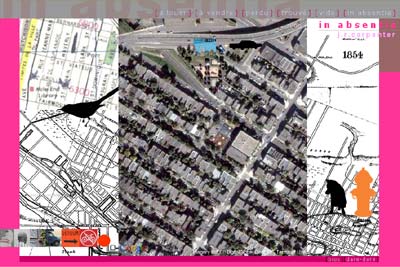
in absentia is a Latin phrase meaning “in absence.” I’m drawn to the contradiction inherent in being in absence. In recent years many long-time low-income neighbours being forced out of Mile End by economically motivated decisions made their absence. So far fiction is the best way I’ve found to give voice these disappeared neighbours, and the web is the best place I’ve found to situate their stories. Our stories. My building is for sale; my family may be next. Faced with imminent eviction I’ve begun to write about the Mile End as if I’m no longer here, and to write about a Mile End that is no longer here. By manipulating the Google Maps API, I am able to populate “real” satellite images of my neighbourhood with “fictional” characters and events. I aim to both literally and figuratively map the sudden disappearances of characters, fictional or otherwise, from the places, real or imagined, where they once lived; to document traces people leave behind when they leave a place, and the stories that spring from their absence. in absentia is a web “site” haunted by the stories of former residents of Mile End, a slightly fantastical world that is already lost but at the same time is still fully known by its inhabitants: a shared memory of the neighbourhood as it never really was but could have been.
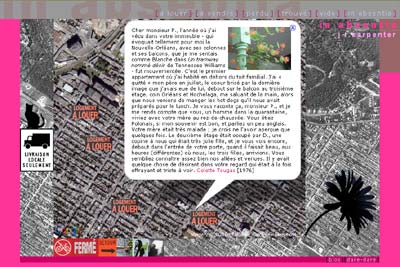
Themes of place and displacement pervade my fiction and electronic literature, yet place long remained an abstract, elusive notion for me. Perhaps because for many years I wrote about long ago places attempting to inhabit pasts that could never be mine. Mapping the minutia of my most immediate surroundings has made my notion of place less abstract and more socially engaged. Writing about my neighbours has made me aware that I write from amongst them, thus engendering a “we” point of view. Increasingly, my work is collaborative. In in absentia (June 2008) I join a cast of writers from my neighbourhood to pen “postcards” to and from former tenants, fictional or otherwise, displaced by gentrification and it’s erasures.
in absentia also marks the end of DARE-DARE’s Dis/location: projet d’articulation urbaine in the Mile End’s parc sans nom. The mobile office will leave the vacant lot that was its home for two years and move towards Montréal’s dowtown, in Cabot Square, corner Sainte-Catherine and Atwater. http://dare-dare.org
J. R. Carpenter is a two-time winner of the CBC Quebec Short Story Competition and a Web Art Finalist in the Drunken Boat PanLiterary Awards 2006. Her novel Words the Dog Knows is forthcoming from Conundrum in the fall of 2008. Her short fiction and electronic literature have been published and exhibited internationally and can be found on http://luckysoap.com.
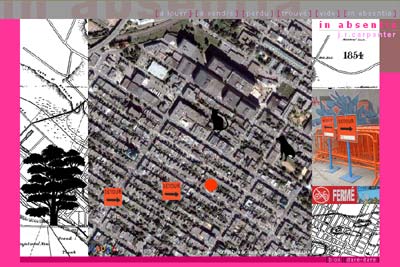
in absentia projet web de J.R. Carpenter inauguré le 24 juin au parc sans nom
DARE-DARE avec nouvelles oeuvres de fiction signées J. R. Carpenter, avec auteurs invités: Lance Blomgren, Andy Brown, Daniel Canty, Alexis O’Hara et Colette Tougas La réalisation du projet se poursuivra jusqu’au 30 novembre 2008. http://luckysoap.com/inabsentia
in absentia est un projet d’écriture sur le Web qui traite de la gentrification dans le quartier Mile-End de Montréal et des disparitions qu’elle entraîne. J.R. Carpenter utilise le HTML, le JavaScript et les cartes API-Google pour créer une narration interactive non linéaire constituée d’histoires « cartes postales » écrites selon le point de vue d’anciens locataires du Mile-End forcés de quitter leur logement à cause de la gentrification. Le projet débutera le 24 juin et se poursuivra au cours de l’été et de l’automne 2008.
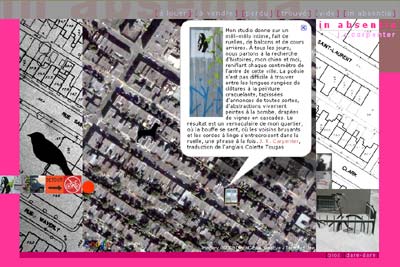
« L’expression latine in absentia signifie “en l’absence de”. Au cours des dernières années, plusieurs de mes voisins à faible revenu qui habitaient le Mile-End depuis longtemps ont été forcés de quitter le quartier en raison de décisions d’ordre économique prises en leur absence. À ce jour, la fiction s’avère le meilleur moyen pour raconter l’histoire de mes voisins disparus et le Web, le meilleur endroit où afficher leur histoire. Notre histoire. L’immeuble que j’habite est à vendre; ma famille et moi subirons peut-être le même sort prochainement. Menacée d’expulsion, j’ai commencé à écrire sur le Mile-End comme si je n’y étais plus et à écrire sur le Mile-End qui n’est plus. En manipulant les cartes API-Google, il m’est possible de peupler de personnages fictifs les “vraies” images satellites de mon quartier et d’inventer des situations. Je cartographie – au sens propre et figuré – la disparition soudaine de personnages fictifs ou non, des endroits où ils ont habité véritablement ou dans l’imaginaire. Je documente les traces que les gens laissent derrière eux lorsqu’ils quittent un endroit ainsi que l’histoire qui émerge de leur absence. in abstentia est un “site” Web hanté par les histoires d’anciens résidants du Mile- End, un univers quasi-fantastique déjà disparu, mais pourtant bien connu de ses habitants: la mémoire commune d’un quartier tel qu’il n’a jamais vraiment été, mais qui aurait pu être. »
« Mes oeuvres de fiction et de littérature électronique baignent dans les thèmes du lieu et du déplacement et pourtant, le lieu est longtemps demeuré un concept abstrait et imprécis à mes yeux. Peut-être parce que j’ai longtemps écrit au sujet de lieux qui n’existaient plus, tentant de m’inscrire dans des passés qui ne pouvaient pas être les miens. »
« Cartographier les menus détails de mon univers immédiat a fait en sorte que je conçois la notion de lieu de façon moins abstraite et avec un plus grand engagement social. En écrivant sur mes voisins, je me suis rendu compte que je me situais parmi eux pour écrire et que, par conséquent, j’adoptais une écriture au “nous”. Je travaille de plus en plus en collaboration. Pour in absentia, je me joins à une équipe d’auteurs de mon quartier pour écrire des “cartes postales” destinées à ou provenant d’anciens locataires, qu’ils soient fictifs ou non, déplacés par la gentrification et les disparitions qu’elle entraîne. »
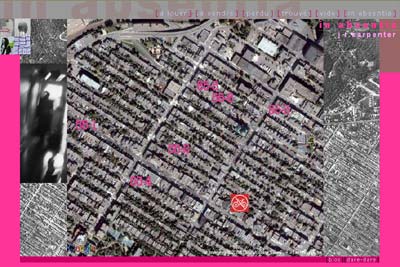
in absentia marque également la fin du présent volet de Dis/location: projet d’articulation urbaine – ainsi que de la présence de DARE-DARE dans le parc sans nom du Mile-End. La roulotte quittera le site inoccupé où elle était établie depuis deux ans, en route pour le square Cabot au centre-ville de Montréal, à l’angle de Ste-Catherine et Atwater. http://dare-dare.org
J. R. Carpenter est deux fois lauréate du Concours de nouvelles de CBC Quebec et finaliste au volet Web Art pour le prix Drunken Boat PanLiterary 2006. Son roman Words the Dog Knows paraîtra à l’automne 2008 aux éditions Conundrum. Ses oeuvres de fiction et de littérature électronique ont été publiées et présentées ici et à l’étranger et sont disponibles en ligne au http://luckysoap.com.
. . . . .


